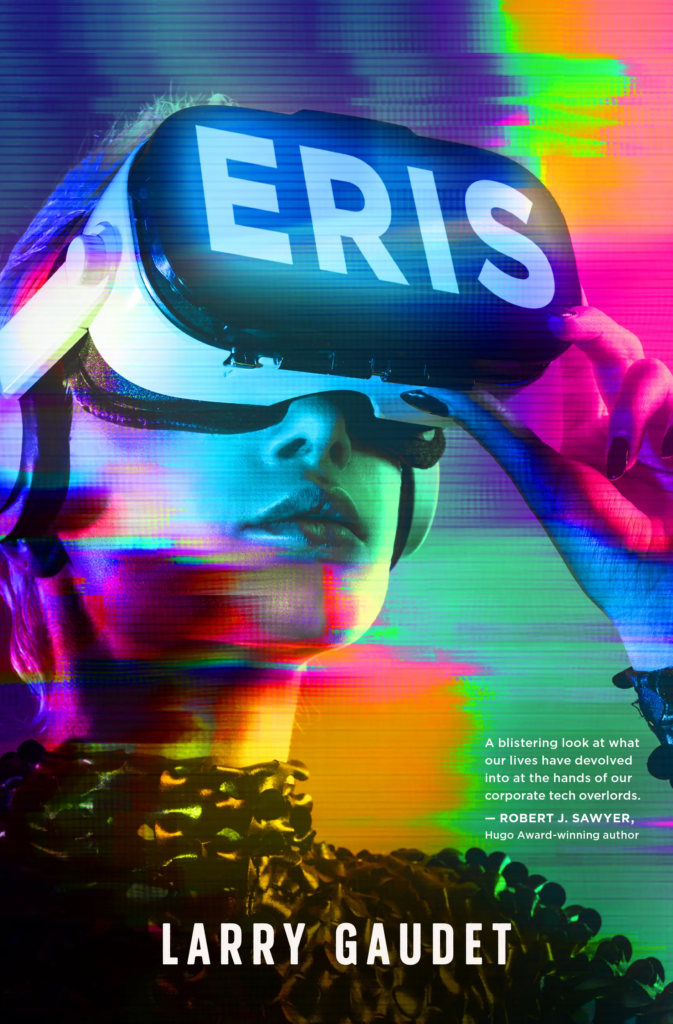Larry Gaudet, long-standing author and pioneer of media exploration in imaginative non-fiction steps back into the digital realm with his latest literary escapade. Eris, the opening act of a soon-to-be trilogy blends the lines of fact and fiction as the reader untangles a web of modern technology. Gaudet delves into the psychological and cultural landscape shaped by the digital age while retracing the premonitions of his earlier works well into the prophetic pulse of his latest cautions.
 What can your readers expect from Eris?
What can your readers expect from Eris?
Those first two novels that I produced for Gutter Press and Sam Hiyate, at the very center of it was something that some [our publisher Hal] would say that nobody at the time was really writing about. It was this weird convergence of technology and corporatization and digital culture and the psychological shift that goes on. I was looking for a way to make something poetic and psychological, or reflective of this psycho-spiritual state that we’re in. This sort of strange nowhere land that’s caught between the real world and the virtual world and all the collisions that happen in the mind and how it’s changing us cognitively. Really look at what it’s doing to culture, or what it’s doing to our economy.
When I wrote my first couple of novels the idea of how we are being changed by technology and what was happening to us was a kind of constant theme. But as the years passed, I was no longer ahead of the conversation. People had caught up. I had to find something a little different to talk about.
I think that the case has been made that our media culture is not a benign force, there’s some benefits to digital life that we can all agree on, but it has an ability to generate pathology and manipulate people, as we’ve seen in the last four or five years. In Eris I take that as a baseline. What if somebody really felt that digital culture was evil or destructive, on the level that maybe a young anti-war activist would have thought that the Vietnam War was? What if somebody in our own culture was fanatical enough to want to attack our entertainment and social media platforms that produce digital culture? What would that look like?
Eris is a fictional cautionary tale about the real consequences of media and technology in our world. Was there a specific current event that inspired you?
I’ve probably been poisoned by many, many years of being involved on the commercial side of the information flow and the evolution of digital culture. You know, I’ve been in the branding business. I did a lot of advertising, always as a kind of outlaw free agent. But I also worked, doing what I would call, marketing and propaganda work for very large tech companies. I was steeped into the utopia they sell you, the delusional values that that world promoted. When I was writing Media Therapy, the internet was still going to bring us all closer together.
Who is the protagonist in Eris? What are her inspirations?
She is like a rookie Meinhof. A contemporary version. She’s a Neo-Marxist fanatic. Against imperialism, against the control of the means of communication to manipulate and distort realities and so on. And she does a lot of horrible things. It was fun for me to have a character like that, even though in the first novel, Media Therapy, I had what I would call a media terrorist at that time. Eris is, in theory, a page-turning, fast-moving thing. But the engine underneath it is pretty darn serious. It’s sort of like you can drink this liquid, and it’ll feel like it’s going down your throat very smoothly, but you’re chewing broken glass at the same time.
As one of the early pathologists of media diseases, do you personally feel afflicted by any of them?
Shit, I’ve got them all. I’ve read the history. But I don’t have main character grandiosity. That’s referring to yourself in the third person. That’s fucking fun.
This interview has been edited and condensed for clarity.
